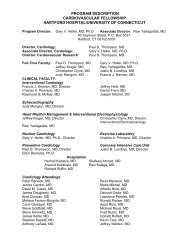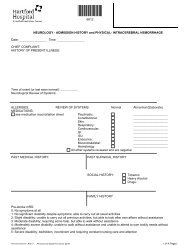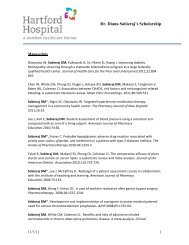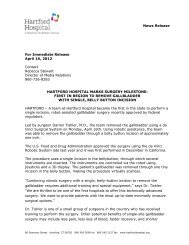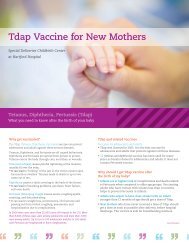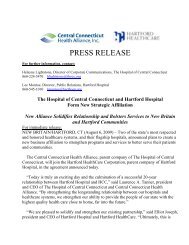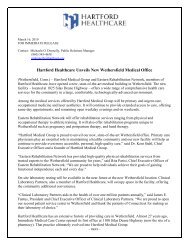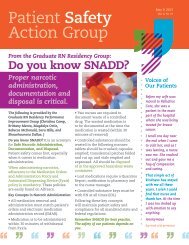Maintaining a Healthy Lifestyle After Transplantation
Maintaining a Healthy Lifestyle After Transplantation
Maintaining a Healthy Lifestyle After Transplantation
Create successful ePaper yourself
Turn your PDF publications into a flip-book with our unique Google optimized e-Paper software.
<strong>Maintaining</strong> a<br />
<strong>Healthy</strong> <strong>Lifestyle</strong><br />
<strong>After</strong> <strong>Transplantation</strong><br />
International Transplant Nurses Society
When should I call my doctor and/or<br />
other members of the transplant team?<br />
<strong>After</strong> receiving a transplant, it is important to keep in touch<br />
with your transplant team. Your team and local physician<br />
will be following your health through routine blood tests,<br />
check-ups, and transplant clinic visits. As you recover and<br />
are learning how to care for yourself, you should contact<br />
your transplant coordinator and/or physician with any<br />
questions or concerns. Finding and treating problems<br />
early, before they become more serious, is important for<br />
your long-term health. Remember that your team is there<br />
to help you and to provide support throughout your<br />
transplant journey!<br />
Organ transplantation leads to better health, increased<br />
activity and an improved quality of life for most recipients.<br />
Now that you have received a transplant, your goal is to<br />
keep your transplanted organ functioning well. As you<br />
recuperate from surgery and get stronger, you can look<br />
forward to having a more normal and active life than<br />
before transplant. <strong>Maintaining</strong> a healthy lifestyle will help<br />
you enjoy the benefits of receiving your transplanted organ.<br />
This booklet will give you strategies for healthy living.<br />
Why could I be at risk for health<br />
problems after transplant?<br />
<strong>After</strong> transplant, there are several important reasons<br />
why you have a greater chance of becoming ill or having<br />
problems. The most common reason why recipients<br />
become ill or have complications after transplant is because<br />
the immune system is suppressed. The medications that<br />
you take after transplant to prevent rejection can lead to<br />
an increased risk of infection. You are at greatest risk of<br />
infection during the first six months after transplant and<br />
any time your immunosuppression is increased to treat<br />
rejection. Some of the medications that you take can<br />
also cause side effects in other systems of your body. For<br />
example, some recipients develop high blood pressure or<br />
high blood sugar after transplant.<br />
Your transplant coordinator or nurse will discuss the most<br />
important signs, symptoms or problems to report as you<br />
recover and are discharged from the hospital. There are<br />
some symptoms that are specific to the transplanted organ.<br />
For instance, a lung transplant recipient has different<br />
concerns than a kidney transplant recipient. But, there are<br />
some symptoms or problems that occur with any type of<br />
organ transplant that are important to report:<br />
• Fever greater than or equal to 101° F or 38.5° C<br />
• Blood pressure readings that are higher than your usual<br />
limits<br />
• Change in your urine: an increased or decreased amount<br />
from usual, red or rusty-brown colored urine, or a<br />
burning sensation when you urinate<br />
• Change in your stools: an increased or decreased<br />
amount, a change in color or firmness (hard stools or<br />
liquid/watery stools), black or bloody stools<br />
• Edema (fluid, swelling, or “puffiness”) in the face,<br />
abdomen, or legs/feet<br />
• Weight gain of two to three pounds/1 kilogram over<br />
night<br />
• A new pain<br />
• A loose cough that produces yellow/green mucous<br />
• Shortness of breath or having difficulty breathing<br />
• Chest pain or a tightness in the chest<br />
• Nausea, vomiting<br />
• Inability to take your medications or take care of yourself<br />
• Light-headedness or being unusually weak or tired<br />
2
How can I avoid health problems after<br />
transplant?<br />
As in the general population, preventing problems and<br />
being aware of any potential risks is very important<br />
to lessen or avoid health problems. Some important<br />
guidelines for staying healthy after transplant include:<br />
• Wash your hands often and well. Frequent and thorough<br />
hand-washing is the best way to prevent infections.<br />
Hands should be washed before preparing food, before<br />
eating, after using the bathroom, and before and after<br />
touching wounds. Hands should also be washed after<br />
touching pets or animals, after changing diapers, after<br />
touching plants or soil, and when visibly dirty.<br />
• Avoid close contact with people who are ill. Many illnesses<br />
are passed through secretions from sneezing and<br />
coughing. Transplant recipients should avoid close<br />
contact with people who have colds, are sneezing and<br />
coughing, have symptoms of the “flu,” or have diarrhea<br />
or are vomiting. Avoiding ill family members who live<br />
in your household may be difficult, particularly if they<br />
have respiratory symptoms (coughing, sneezing, cold<br />
and flu symptoms). In that case, some transplant centers<br />
recommend that both the transplant recipient and<br />
infected person wear a mask until the symptoms resolve.<br />
Direct contact with the household member who is ill<br />
should be avoided as much as possible and good hand<br />
washing should be maintained.<br />
• Avoid crowds. Some transplant centers advise transplant<br />
recipients to avoid large crowds, particularly in the<br />
first three months after transplant and/or during cold<br />
and flu season. Remember that the higher your level<br />
of immunosuppression, the more likely you are to get<br />
an infection. Discuss your risk with your physician and<br />
transplant coordinator and follow your center’s guidelines.<br />
• Avoid environments where potential infective organisms may<br />
live. Transplant recipients should stay away from places<br />
that may lead to infection in immunosuppressed<br />
patients. These environments include construction<br />
sites, homes or buildings that have mold, indoor<br />
botanical gardens that are very humid, and rooms with a<br />
high level of tobacco smoke.<br />
What routine health care providers should I see?<br />
What types of routine check-ups are important for me?<br />
It is important to maintain your overall good health after<br />
transplant. All transplant recipients should have a primary<br />
care physician (PCP) or general practitioner (GP). This<br />
physician provides routine physical examinations, follows<br />
the results of blood tests, and manages preventative<br />
healthcare and screenings. Your PCP/GP provides medical<br />
care for common health problems and those related to<br />
transplant such as high blood pressure, diabetes, high<br />
cholesterol, or bone disease. Discuss your healthcare<br />
management with your transplant physician, transplant<br />
coordinator, and local physician to be sure that you are<br />
being followed in a comprehensive way. Each team<br />
member plays an important role in your long term care.<br />
Having routine health screenings will help guide your care<br />
after transplant and detect problems early. Screening is<br />
a way to look for signs of a medical problem in a person<br />
who has no symptoms. If a disease or condition is found in<br />
its early stages, treatment may be more effective. Routine<br />
screenings for some common medical conditions are<br />
recommended for the general population as well. Ask your<br />
doctor and transplant team what screenings are right for you.<br />
3
Routine Screenings and Examinations<br />
Dental Care<br />
<strong>Maintaining</strong> healthy teeth and gums is an important part<br />
of your care after transplant. As in the general population,<br />
transplant recipients can develop gum disease, tooth decay,<br />
mouth ulcers, dry mouth, and mouth infections. Some<br />
dental problems may be related to side effects of some of<br />
the medications you take after transplant. You can also<br />
develop infections more easily because your immune<br />
system is suppressed. Bacteria that are commonly in the<br />
mouth can cause infection.<br />
It is important that you visit your dentist and hygienist<br />
for regular check-ups and cleanings every 6 months. If<br />
you develop problems, you may need check-ups every 3<br />
or 4 months. Examine your mouth regularly and call your<br />
physician and/or dentist if you have chipped or cracked<br />
teeth, tooth pain, swellings or sores in your mouth, red or<br />
swollen gums, bleeding, or white patches on your tongue<br />
or the lining of your mouth. Be sure to brush your teeth at<br />
least twice a day, particularly after meals and before going<br />
to sleep. Floss between your teeth daily to remove food<br />
particles and plaque.<br />
Eye Care<br />
Eye and vision examinations are important for everyone.<br />
Vision screenings (checking how well you see) can be<br />
completed regularly by a health care professional to detect<br />
problems. The need for a dilated eye examination by an eye<br />
doctor (ophthalmologist) is usually determined by age or a<br />
specific eye problem. For this test, the eye doctor uses eye<br />
drops to temporarily enlarge the pupil (the black center)<br />
of the eye. When the pupil is enlarged, the eye doctor<br />
can see the inside of the eye more easily. The dilated eye<br />
examination can detect serious problems such as glaucoma,<br />
cataracts, diabetes, infection, and cancer.<br />
Transplant recipients may have an increased risk of<br />
developing eye problems from the medications that suppress<br />
the immune system. Discuss the risk of developing eye<br />
problems with your transplant physician or transplant<br />
coordinator. Some transplant centers recommend<br />
ophthalmology exams every year for those at risk. You<br />
and your doctor should decide on the frequency of an<br />
examination by an eye doctor that best meets your needs as a<br />
transplant recipient. Diabetic patients should have a dilated<br />
eye examination with an eye doctor at least once a year.<br />
If you are having your teeth cleaned or having a procedure<br />
that may injure your gums, some transplant centers<br />
recommend taking an antibiotic before your dental<br />
appointment. Contact your transplant coordinator about<br />
your center’s recommendations for infection prevention<br />
before dental work. Your dentist can prescribe the<br />
appropriate antibiotic to prevent infection.<br />
For more complete information about dental care, refer<br />
to What Every Patient Needs to Know about Dental Care,<br />
published by the International Transplant Nurses Society.<br />
Available at: http://www.itns.org/education/patientmaterials<br />
The most common eye problems seen after transplant<br />
include cataracts, changes in the pressure of the eye<br />
(intraocular pressure) leading to glaucoma, scarring in the<br />
layer of blood vessels behind the retina, and damage to the<br />
small blood vessels in the retina due to diabetes (diabetic<br />
retinopathy). Eye infections have also been reported but<br />
are not as common now due to improved anti-rejection<br />
protocols and treatments to prevent infection.<br />
• A cataract is a clouding of the clear lens of the eye.<br />
Cataracts are usually related to aging of the eye. Other<br />
risk factors include diabetes, steroids, smoking, long<br />
term unprotected exposure to the sun’s UV rays, and<br />
injury to the eye.<br />
• Glaucoma results from damage to the optic nerve. This<br />
nerve carries the images we see to the brain. Damage<br />
to the optic nerve is often seen with increased pressure<br />
inside the eye (intraocular pressure). You are at increased<br />
risk for developing glaucoma if you:<br />
• are 60 years of age or older<br />
• are African American, particularly those over the<br />
age of 40<br />
• have a family history of glaucoma<br />
4
• have a medical history of diabetes or a serious eye<br />
injury<br />
• are taking medications that increase the risk of<br />
glaucoma<br />
• Diabetic retinopathy occurs when the blood vessels<br />
inside the retina become damaged from high blood sugar<br />
levels. When the blood vessels are damaged, fluids may<br />
leak into the retina and block the flow of blood. Diabetic<br />
retinopathy may lead to vision loss.<br />
Call your primary care physician and/or eye doctor if you<br />
have any symptoms of eye problems including:<br />
• eye pain<br />
• changes in vision such as blurring, double vision, or<br />
fading of colors<br />
• flashes of light<br />
• sensitivity to light<br />
• seeing spots<br />
• the appearance of dark spots in your vision<br />
• distorted or wavy lines or edges of objects<br />
• dry eyes with redness, itching, and/or burning<br />
Routine Lab/Blood Tests<br />
Having lab tests (blood tests) completed routinely is another<br />
important part of your care that contributes to a healthy<br />
lifestyle after transplant. Your transplant team will monitor<br />
the results of your lab tests to determine how your body is<br />
recovering and how well the transplanted organ and other<br />
body systems are functioning. Sometimes medications<br />
may be changed or added based on your blood tests.<br />
Blood tests are obtained more frequently in the early weeks<br />
or months after transplant and then less often over time.<br />
You may be asked to get your blood tests repeated more<br />
frequently if you are sick or experiencing any complications<br />
related to your transplant.<br />
There are many blood tests that are available to monitor<br />
your health. The most common tests obtained after<br />
transplant for most organ transplant recipients include:<br />
• The level of your anti-rejection medicine: The blood level<br />
of your anti-rejection medicine (cyclosporine, tacrolimus,<br />
sirolimus) is monitored very closely after transplant.<br />
If this level is too low, the rejection process may start. If<br />
this level is too high, infection may develop because your<br />
immune system has been suppressed too much. This<br />
level will change over time, but is usually high for the<br />
first three to six months after transplant. This level may<br />
be decreased over time if you have not had any episodes<br />
of rejection or if you have a significant infection. Other<br />
factors that can change your immunosuppression level<br />
include: the affect of other medications (drug<br />
interactions), taking the medication on an empty or full<br />
stomach, and eating/drinking any form of grapefruit.<br />
The timing of your anti-rejection medicine can also affect<br />
the level. Remember that the blood test for your antirejection<br />
medication must be obtained no earlier than 2<br />
hours before you take a dose of that medication. For<br />
example, if you take your anti-rejection medication at<br />
9:00 AM, your blood level should be drawn between<br />
7:00 AM and 9:00 AM, before you take your dose.<br />
• Kidney function and electrolytes: These blood tests<br />
show how well the kidneys are functioning. If the<br />
kidneys are not working well, the electrolyte levels<br />
(magnesium, sodium, potassium, phosphorus) may not<br />
be in the normal range. The kidney function tests also<br />
include the blood urea nitrogen level (BUN) and<br />
creatinine. Abnormal kidney function tests in kidney<br />
transplant patients may be a sign of rejection.<br />
• Liver function tests: The liver function tests monitor<br />
liver function in all patients. These lab values also help<br />
detect rejection, infection, or bile duct blockage for liver<br />
transplant patients. These tests include the ALT (alanine<br />
aminotransferase), AST (aspartate aminotransferase),<br />
GGTP (gamma-glutamyl transferase) and total bilirubin.<br />
• Complete blood count (CBC) or full blood count (FBC):<br />
This blood test is monitored to check for infection,<br />
the effects of anti-rejection medications, anemia (low red<br />
blood cell count), and many other conditions related to<br />
the red cells and white cells of the blood.<br />
• Infection: Tests to check for cytomegalovirus (CMV)<br />
and Epstein Barr Virus (EBV) are also drawn routinely in<br />
patients who are at risk for these viruses.<br />
5
Post-transplant diabetes: Monitoring<br />
your blood glucose levels<br />
Diabetes is an illness that effects how your body makes and<br />
uses a hormone called insulin. It is a serious disease that is<br />
associated with many health problems and complications.<br />
Risk factors for developing diabetes include:<br />
• Family history of diabetes<br />
• Ethnic background of African American, Native<br />
American, Native Alaskan, Hispanic and Pacific Islander<br />
• Obesity<br />
• Inactive life style<br />
• Older age<br />
• Abnormal blood levels of cholesterol or triglycerides<br />
• Immunosuppressant medications<br />
Diabetes is a significant risk for people who have had organ transplants. The medications that you take to prevent<br />
rejection of the transplanted organ may increase your risk of developing diabetes. Diabetes is diagnosed by checking<br />
levels of glucose in your blood. Your physician will monitor your blood glucose levels through several types of tests.<br />
Glucose levels are high in people who have diabetes.<br />
Sometimes diabetes can be controlled in transplant recipients by making changes in anti-rejection medications. Losing<br />
excess weight, changing eating habits, and exercising daily can also help. Some individuals may need daily insulin shots<br />
while others may be managed with medications that are taken by mouth.<br />
Although there is no cure for diabetes, it is treatable. Those who develop diabetes after transplant should work with their<br />
doctor and diabetic educator to understand their care, diet, and medications and to make healthy lifestyle choices.<br />
For more complete information about diabetes, refer to Post-Transplant Diabetes: What Every Patient Needs to Know, published<br />
by the International Transplant Nurses Society. Available at: http://www.itns.org/education/patient-materials<br />
Monitoring your cholesterol levels<br />
Cholesterol is a waxy fat-like substance produced by the<br />
liver. It is important for body functions such as building<br />
new cells, insulating nerves, and producing Vitamin D and<br />
some hormones. If there is too much cholesterol in your<br />
blood, it can build up inside blood vessels, causing heart<br />
disease.<br />
There are two types of cholesterol: low-density lipoprotein,<br />
LDL or “bad cholesterol,” and high-density lipoprotein,<br />
HDL or “healthy cholesterol.” LDL cholesterol leads to<br />
the build up of plaque in your arteries, eventually causing<br />
heart disease. HDL helps keep the LDL from building up<br />
in the arteries.<br />
The level of LDL cholesterol in your blood is affected by<br />
diet. Other factors include weight, exercise, age, gender,<br />
heredity, and some medical conditions. Transplant<br />
recipients have a slightly higher risk of developing high<br />
cholesterol because some anti-rejection medications can<br />
6<br />
increase cholesterol levels. Your transplant team or PCP/<br />
GP will monitor your cholesterol levels by performing<br />
routine blood tests.<br />
You can help control your cholesterol levels in several<br />
ways:<br />
• Choose lean meats and chicken.<br />
• Avoid fried foods that are cooked in hydrogenated<br />
vegetable oil.<br />
• Avoid processed foods.<br />
• Use egg substitutes or egg whites instead of whole eggs.<br />
• Use low fat milk products and low fat cheeses.<br />
• Increase your fiber intake through whole grain products,<br />
fruits, and vegetables.<br />
• Exercise daily. Regular exercise can decrease your LDL<br />
(bad cholesterol) and increase your HDL (good cholesterol).<br />
• Have your blood tests completed as requested by your<br />
transplant team or PCP/GP to monitor your cholesterol<br />
levels.<br />
• Ask your doctor if high cholesterol is a side effect of any<br />
of the medications that you are taking.
Gynecologic examinations<br />
Recommendations for routine gynecologic and breast<br />
examinations vary by country, so it is important that you follow<br />
your doctor’s advice and guidelines.<br />
Many transplant centers advise their female transplant<br />
recipients who are 18 years of age or older and/or are<br />
sexually active to have a gynecologic examination every<br />
year. This examination is the same as for the general<br />
population and should include a pelvic exam to detect<br />
any abnormalities of the uterus, a breast examination to<br />
evaluate changes in the breast tissue, and a Papanicolaou’s<br />
smear (Pap smear) to detect any abnormalities of the cervix.<br />
Women ages 18-39 should have a professional breast<br />
exam every 3 years, or as needed, and should perform a<br />
monthly breast self-examination. Women 40 years of age<br />
and older should have a yearly mammogram and perform<br />
a monthly breast self-exam. Physicians may advise women<br />
who have a family history of breast cancer or other risk<br />
factors to have a mammogram before the age of 40 or more<br />
frequently.<br />
Prostate screening<br />
The prostate is a walnut-sized gland that is part of the male<br />
reproductive system. It is located in front of the rectum<br />
and below the bladder. The prostate makes the fluid that<br />
carries sperm. Prostate cancer is one of the most common<br />
forms of cancer in men. Although the cause of prostate<br />
cancer is not known, some risks have been identified.<br />
These include:<br />
• Age: The risk of getting prostate cancer is greater as men<br />
get older.<br />
• Family history: A man is more likely to develop prostate<br />
cancer if his father or brothers had prostate cancer.<br />
• Race: Prostate cancer is more common in some racial<br />
and ethnic groups. It is more common in African<br />
American men than Caucasian men. Men of Hispanic,<br />
Asian, Native American, or Pacific Islander descent are<br />
less likely to develop prostate cancer than Caucasians.<br />
A blood test called the prostate-specific antigen test (PSA)<br />
is used to screen for prostate cancer. This test measures<br />
the level of a substance (enzyme) produced by the prostate<br />
and checks whether or not this level is within the normal<br />
range. Another test used to screen for prostate cancer is<br />
the digital rectal examination (DRE). For this examination,<br />
the physician inserts a gloved lubricated finger gently into<br />
the rectum to feel the back of the prostate. The physician<br />
checks the size of the gland and feels for any irregularities.<br />
The screening recommendations for prostate cancer based<br />
on scientific studies are unclear. Some physicians who<br />
support regular screening believe that the research shows<br />
that finding and treating prostate cancer early may save<br />
lives. These physicians recommend that all men who<br />
expect to live for at least 10 more years should be given<br />
the opportunity to have the PSA blood test and DRE every<br />
year, starting at age 50. Men who are African American or<br />
have a family history should be tested earlier. However,<br />
some physicians do not recommend regular screenings<br />
because they believe that finding and treating prostate<br />
cancer early may not save that person’s life. They believe<br />
that the side effects of treatment are worse than the possible<br />
benefits because most prostate cancers grow very slowly<br />
and may never affect the man’s life.<br />
It is important that you discuss prostate screening with<br />
your physician. You should know your risk factors for<br />
prostate cancer and the pros and cons of screening to make<br />
the best decision for you.<br />
Colorectal Screening Tests<br />
Recommendations for colorectal examinations vary by country,<br />
so it is important that you follow your doctor’s advice and<br />
guidelines.<br />
Colorectal screening (examination of the large intestine<br />
and rectum) is recommended for both men and women 50<br />
years of age and older to detect signs of colorectal cancer.<br />
This cancer is an abnormal growth of tissue that occurs in<br />
the colon (large intestine) or rectum. It is the third most<br />
common cancer after prostate cancer and lung cancer in<br />
men. In women, it is the third most common cancer after<br />
breast cancer and lung cancer. Colorectal cancer is very<br />
7
treatable when diagnosed at an early stage. It can be<br />
prevented through regular screening tests that can find<br />
abnormal growths (precancerous polyps). These growths,<br />
or polyps, can be removed before they turn into cancer.<br />
Screening is important because polyps and colorectal<br />
cancer may not cause any symptoms, particularly in the<br />
early stages.<br />
The most common tests or procedures used to screen for<br />
colorectal cancer include:<br />
• Fecal occult blood test (FOBT). This test is performed on<br />
samples of stool to check for blood that may not be easy<br />
to see in the stool. This testing should be done every<br />
year in men and women 50 years of age or older.<br />
• Colonoscopy. This procedure is done by a<br />
gastroenterologist (GI doctor). The doctor uses a flexible,<br />
lighted tube called a colonoscope to look at the inside<br />
walls of the rectum and the colon (large intestine).<br />
During this procedure, samples (biopsy) of the colon<br />
tissue are taken for examination. If abnormal growths<br />
(polyps) are found, they may be removed. A<br />
colonoscopy is used as a screening test at the age of 50.<br />
This test may be done if other screening tests show<br />
a problem or to further diagnose a disease. This test<br />
should be done every 10 years, but may be repeated<br />
sooner if the results of the previous test were of concern.<br />
• Flexible sigmoidoscopy. This is a procedure done by a<br />
gastroenterologist (GI doctor) using a flexible, lighted<br />
tube (sigmoidoscope) to examine the inside walls of the<br />
rectum and part of the colon. It is recommended for<br />
people at the age of 50 years and is repeated every 5 years.<br />
• Double-contrast barium enema. This test involves<br />
having an enema with a special dye (barium). Following<br />
the enema, a series of X-rays are taken to view the dye<br />
going through the colon and rectum. The procedure<br />
is recommended for people at the age of 50 years and is<br />
repeated every 5 years.<br />
Skin cancer screening<br />
Transplant recipients have an increased risk of developing<br />
skin cancer. This risk is up to 65 times greater than in<br />
people who have not had a transplant. The medications<br />
that transplant recipients take to suppress their immune<br />
system cause this increased risk. Your chance of<br />
developing skin cancer is also related to how old you are<br />
at the time of transplant, the types of anti-rejection meds<br />
you have taken, how long you have taken anti-rejection<br />
medications, and the amount of immunosuppression you<br />
have received. Additional risk factors for skin cancer<br />
include having:<br />
• fair or easily burned skin<br />
• lots of freckling<br />
• red or blonde hair<br />
• blue, green or hazel eyes<br />
• history of extensive sun exposure<br />
• family history of skin cancer<br />
• previous skin cancers<br />
Almost all skin cancers can be cured if detected early. As a<br />
transplant recipient, you should examine your skin every<br />
month. Look for any new or changing growths including<br />
pink patches or spots, scaly growths, bleeding spots, or<br />
changing moles. Your PCP/GP should thoroughly examine<br />
your skin during your annual check-up or refer you to a<br />
dermatologist. If you are at high-risk for developing skin<br />
cancer, you may be asked to see a dermatologist regularly.<br />
Transplant recipients should always use sun screen with a<br />
sun protection factor (SPF) of at least 30 to protect their skin<br />
from damaging light rays. Sunscreen should be used on<br />
all exposed areas of your skin. It is also important to wear<br />
sunglasses, a broad-rimmed hat, and protective clothing.<br />
Outdoor activities should be avoided or limited during the<br />
time when the sun’s rays are the strongest, between 10:00<br />
AM and 4:00 PM. Transplant recipients should not use<br />
tanning booths.<br />
Your doctor will advise you about when you should be<br />
screened for colorectal cancer and which test or tests are<br />
right for you. In addition to routine screening, it is very<br />
important to tell your PCP/GP about any changes in your<br />
stools or bowel routine such as an increased or decreased<br />
amount of stool, a change in color, a change in the firmness<br />
or texture of your stool (hard stools or liquid/watery<br />
stools), or the appearance of blood.<br />
8
Bone density screening<br />
Osteoporosis is a disease in which the bones become fragile<br />
and more likely to break or fracture. Most people think that<br />
osteoporosis occurs only in women, but men can develop<br />
this condition as well. Although any bone can be affected<br />
by osteoporosis, the bones of the hip, spine, and wrist are at<br />
greatest risk. Osteoporosis can progress painlessly until a<br />
bone breaks if not prevented or if left untreated.<br />
Risks factors for developing osteoporosis include:<br />
• Age: Your bones become weaker and less dense as you age.<br />
• Gender: Women are more likely to develop osteoporosis<br />
because of the effects of menopause and because they<br />
have less bone tissue than men.<br />
• Family history: Osteoporosis tends to run in families.<br />
• Race: Caucasian and Asian women are at greater risk.<br />
Hispanic and African-American women have a lower risk.<br />
• Bone structure and weight: Small framed women<br />
weighing less than 127 pounds/58 kilograms are at<br />
greater risk for osteoporosis.<br />
• Menopause: Women lose up to 20% of their bone mass<br />
within the first five to seven years after menopause.<br />
• Life style: Smoking, high alcohol intake, not getting<br />
enough calcium in your diet, and not exercising or<br />
having an inactive lifestyle can contribute to<br />
osteoporosis.<br />
• Medications: Certain medications, such as steroids, can<br />
increase the risk of osteoporosis.<br />
• Chronic disease: Some long-term health conditions,<br />
such as chronic kidney disease, can increase the risk of<br />
osteoporosis.<br />
Transplant recipients are at an increased risk for developing<br />
osteoporosis. Some anti-rejection medications can cause<br />
osteoporosis, particularly in the first 6-12 months after<br />
Blood pressure screening<br />
Blood pressure is the measurement of the force of blood<br />
pushing against the walls of the arteries in your body.<br />
The “top” number or systolic blood pressure measures this<br />
pressure at the highest level - when the heart beats. The<br />
“bottom” number, the diastolic blood pressure, measures<br />
the pressure between beats - when the heart is at rest.<br />
Normal blood pressure for most adults is 120/80. High<br />
blood pressure, called hypertension, is a blood pressure<br />
measurement of 140/90 or greater. In some patients<br />
however, a blood pressure of greater than 130/80 is<br />
considered high. Ask your doctor what range of blood<br />
pressure measurements is right for you.<br />
transplant when immunosuppressant levels are high.<br />
Prednisone, cyclosporine, and tacrolimus are all associated<br />
with osteoporosis. Your chance of developing<br />
osteoporosis depends on your general risk factors as well<br />
as the amount of immunosuppression and length of time<br />
you are prescribed high levels of these medicines.<br />
There are several things you can do to prevent<br />
osteoporosis.<br />
• Eat a well-balanced diet that is rich is calcium and<br />
vitamin D. Talk to your transplant dietician for advice<br />
on the amounts and types of foods that are right for you,<br />
particularly if you have additional health problems.<br />
• Be active! Exercise daily and include aerobic and weightbearing<br />
exercises in your routine.<br />
• Live a healthy lifestyle. Do not smoke. Avoid alcohol<br />
or follow your transplant center’s guidelines on alcohol<br />
intake.<br />
• Ask your PCP/GP about your need for having a bone<br />
mineral density (BMD) test. Recommendations for<br />
having this test are based on your age, risk factors, and<br />
any recent fractures. A BMD measures the density<br />
of your bones, or bone mass, and is painless, safe, and<br />
noninvasive.<br />
• Medications may be helpful in some people. Although<br />
osteoporosis can not be cured, there are several types of<br />
medications that treat this condition.<br />
Your doctor and transplant team will always monitor your<br />
immunosuppression levels and your risks for developing<br />
osteoporosis. In some cases, medications or doses may<br />
be changed to decrease your risk. Never discontinue<br />
or change these medications on your own. Talk to<br />
your transplant team about your risks for developing<br />
osteoporosis after transplant.<br />
The risk of developing high blood pressure is greater if you<br />
are:<br />
• African-American<br />
• a man greater than 45 years of age<br />
• a woman greater than 55 years of age<br />
• overweight<br />
• diabetic<br />
• have a family history of high blood pressure<br />
The reason for developing high blood pressure is<br />
unknown in some people. This is called primary or essential<br />
hypertension. Other people develop high blood pressure as<br />
a result of another health problem or medications. This is<br />
called secondary hypertension.<br />
9
In addition to the risk factors for developing high blood<br />
pressure, there are some lifestyle choices that can raise<br />
blood pressure. These include:<br />
• inactivity<br />
• diets with too much salt or not enough potassium<br />
• stress that is long-lasting<br />
• smoking<br />
• excess alcohol use<br />
• using some over-the-counter medications (decongestants,<br />
antihistamines)<br />
There are often no symptoms for high blood pressure,<br />
so people may not realize they have high blood pressure<br />
until they start having health problems. It is important for<br />
everyone to have blood pressure readings done routinely<br />
to screen for high blood pressure. If high blood pressure is<br />
not detected and treated, it can damage your arteries, heart,<br />
and kidneys. High blood pressure can lead to stroke, heart<br />
attack, and kidney failure. Although high blood pressure<br />
can last for a long time, or even your life time, it can be<br />
treated and controlled to avoid these health problems.<br />
Hypertension is very common after transplant for several<br />
reasons.<br />
• Medications: As a transplant recipient, some of<br />
the medications that you take may affect your blood<br />
pressure. Sometimes the doses of these medications<br />
can be changed to have less affect on your blood<br />
pressure. Sometimes a different medication that does not<br />
affect blood pressure may be used. Remember, never<br />
stop taking your medications or change the dose unless<br />
told to do so by your doctor.<br />
• Organ function: Your blood pressure may be affected by<br />
how well your transplanted organ is working.<br />
• <strong>Lifestyle</strong> and other risks: Your lifestyle choices and risk<br />
factors can contribute to having a high blood pressure.<br />
Eating healthy, maintaining a healthy weight, being<br />
physically active, not smoking, and limiting alcohol<br />
may help lower your blood pressure. You can not<br />
change your family history, ethnic background, or age,<br />
but understanding these additional risks can lead to<br />
living a more healthy lifestyle.<br />
If you have high blood pressure and it is not under control<br />
with changes in your health habits and medications, your<br />
doctor may also prescribe antihypertensive medications<br />
to lower your blood pressure. There are several types of<br />
blood pressure medicines that can be used to lower blood<br />
pressure. Some of these work by getting rid of extra fluid<br />
and salt from your body. Others work by slowing your<br />
heart rate or relaxing blood vessels. Doctors often prescribe<br />
more than one type of blood pressure medicine to more<br />
effectively lower your blood pressure. Most people need<br />
to take blood pressure medications for a long time to keep<br />
their blood pressure in the appropriate range.<br />
You or your family members have been taught how to<br />
measure your blood pressure with a blood pressure cuff<br />
(sphygmomanometer) and a stethoscope or with an electronic<br />
monitor to use at home. Measure your blood pressure<br />
routinely as instructed by your doctor and know what<br />
blood pressure levels are right for you. It is also important<br />
to take your medications as prescribed if you have high<br />
blood pressure and make lifestyle changes to improve your<br />
health.<br />
What should I know about<br />
immunizations?<br />
Immunizations are an important part of routine healthcare<br />
for everyone. Adult transplant recipients have usually<br />
received all required immunizations before transplant but<br />
infants and young children may not because of their age or<br />
being too ill. If a transplant recipient needs immunizations,<br />
there are some important exceptions. Transplant recipients<br />
can not receive any “live” vaccines. These vaccines<br />
contain a small amount of weakened live virus to provide<br />
immunity from that virus. Receiving a live vaccine, even<br />
though weakened, may cause serious health complications<br />
in someone who is immunosuppressed.<br />
10<br />
There are several live vaccines. The most common live<br />
vaccines that immunosuppressed patients should never<br />
receive are:<br />
• Oral polio (Sabin): The oral polio (Sabin) vaccine<br />
contains a live but weakened form of the polio virus<br />
that is given to provide immunity against the polio<br />
virus (poliomyelitis). The inactivated form or “killed”<br />
polio vaccine (Salk) is an injection or “shot.” The shot<br />
form of the polio vaccine should be given to transplant<br />
recipients instead of the oral polio vaccine.<br />
• MMR (Measles, Mumps, Rubella): Adults do not usually<br />
need the MMR vaccine because they received this shot<br />
and boosters when they were children. It is given to<br />
children at 12-15 months and again at 4-6 years.<br />
• Varivax (chicken pox or varicella vaccine): This is a live<br />
vaccine given to children around the age of 12 months to<br />
protect them against chickenpox (varicella).
Should I get the “flu shot?”<br />
The flu shot or injection is an inactivated (killed) vaccine<br />
that contains three influenza strains (types) that are<br />
expected to be seen most often in that year. People who<br />
want to decrease their risk of getting the flu should get the<br />
flu shot. Older people, very young children, and people<br />
with certain health conditions are at high risk for becoming<br />
very sick with the flu.<br />
Transplant recipients are usually advised to get the flu shot<br />
every year. Ask your transplant team for your center’s<br />
recommendations. The best time to get the vaccine is in<br />
October or November, although your doctor may advise<br />
you to get it earlier. It takes about 2 weeks for protection<br />
to develop in your body and this can last for almost a year.<br />
Most transplant centers recommend that caregivers and<br />
other people in the household who have close contact with<br />
the transplant recipient also get the flu vaccine.<br />
People should not get the influenza vaccine if they have<br />
had:<br />
• a severe allergic reaction to eggs<br />
• an allergic reaction to the flu shot in the past<br />
• Guillain-Barré Syndrome (a disease that results in muscle<br />
weakness and sometimes paralysis)<br />
What other lifestyle issues are<br />
important after transplant?<br />
Nutrition<br />
A healthy diet is one that is made up of fruits, vegetables,<br />
whole grains, and low fat or fat free milk and milk<br />
products. It also includes lean meats, poultry (chicken,<br />
turkey), fish, eggs, nuts, and beans. A healthy diet should<br />
be low in saturated fats, trans fats, salt, added sugar, and<br />
cholesterol.<br />
<strong>After</strong> organ transplant, most transplant recipients have few<br />
restrictions or limits in their diet. Your dietary guidelines<br />
are much the same as for any person who is trying to eat<br />
healthy. If you do have other health problems, such as high<br />
blood sugar or high blood pressure, your transplant team<br />
will give you special instructions about your diet. Fad<br />
diets, diet supplements, and herbal products should be<br />
avoided.<br />
The level of some anti-rejection medications is affected when<br />
taken with grapefruit or grapefruit juice. Most transplant<br />
centers recommend that transplant recipients avoid all forms<br />
of grapefruit if they are taking cyclosporine or tacrolimus<br />
(Prograf ® ).<br />
Check with your transplant team about getting the flu shot<br />
if you are within the first three months after transplant or<br />
if you have recently been treated for rejection. You should<br />
not get the influenza vaccine if you have a fever when you<br />
visit the doctor’s office for your shot. Be sure to reschedule<br />
an appointment to get the vaccine at a later date when you<br />
are feeling better.<br />
Can I get the flu nasal spray instead of<br />
having a shot?<br />
A new form of the flu vaccine that is given as a nasal<br />
spray has been available since 2003 for use in healthy<br />
people, ages 5 through 49 years. Transplant recipients<br />
and people with suppressed immune systems can not get<br />
this form of the flu vaccine. The nasal spray flu vaccine<br />
contains weakened live influenza viruses instead of killed<br />
viruses. This live vaccine may place them at high risk for<br />
complications from the flu.<br />
11
Exercise<br />
Exercise and physical activity is important to your overall<br />
health. It is important to talk with your transplant team<br />
about increasing your activity level and when to begin<br />
an exercise routine. This will depend on how well you<br />
have recovered after transplant, what type of organ you<br />
received, and other medical problems.<br />
Exercise improves your overall health. It makes you feel<br />
better and can help control stress. Regular exercise can<br />
help you maintain a weight that is right for you. It can also<br />
help prevent bone disease (osteoporosis). Any physical<br />
activity that you can do is beneficial. Walking, swimming,<br />
riding a bicycle, lifting weights, playing golf or tennis,<br />
participating in yoga classes or even doing housework<br />
counts as exercise! Staying active is key to living a full and<br />
healthy life.<br />
All transplant recipients should discuss their exercise<br />
program with their doctor and transplant team so that a<br />
safe exercise plan can be developed. This is particularly<br />
important for heart transplant recipients because they must<br />
follow specific warm-up and cool-down routines. Discuss<br />
the exercise program that is right for you with your doctor<br />
and transplant team. Your team can help you develop a<br />
plan that is right for you.<br />
To be healthy and fit is an important goal, but using<br />
common sense to reach this goal is just as important.<br />
Even months or years after your transplant, exercising<br />
when you are sick with a fever is not a good idea. If you<br />
ever experience any intense pain, chest pain, or shortness<br />
of breath while exercising, you should stop exercising<br />
immediately and seek medical attention or advice.<br />
For more complete information about nutrition and<br />
exercise, refer to Diet and Exercise <strong>After</strong> Transplant,<br />
published by the International Transplant Nurses Society.<br />
Available at: http://www.itns.org/education/patientmaterials<br />
Sexual activity<br />
Sexual activity is an important part of adult life. Before<br />
transplant, many patients experience a decreased desire<br />
(libido) to have sex or are unable to have sex (impotence)<br />
because of health problems. <strong>After</strong> transplant, both men<br />
and women find their desire and ability to have sex returns.<br />
Most transplant centers advise that patients wait for six to<br />
eight weeks before resuming sexual activity. How quickly<br />
you are ready to have sex after transplant depends on how<br />
you feel. Ask your transplant doctor or coordinator when<br />
it is medically safe for you to have sex. When you are<br />
ready to resume sexual activity, it may be helpful to discuss<br />
any concerns you may have with your partner.<br />
Safe sex practices are important for everyone who is<br />
sexually active to avoid the risk of contracting sexually<br />
transmitted diseases (STD). Transplant recipients have<br />
an increased risk of getting an STD because their immune<br />
system is suppressed. Practicing safe sex is the best way to<br />
prevent STDs. Safe sex practices include:<br />
• having sex with only one partner (a monogamous<br />
relationship)<br />
• washing your genitals before and after sex<br />
• always using latex condoms with spermicide<br />
• avoiding sex with anyone who has sores, a rash, or a foul<br />
discharge from their genitals<br />
• avoiding anal sex<br />
12
Birth control and pregnancy<br />
When you resume sexual activity after transplant, an<br />
appropriate method of birth control should be used.<br />
Barrier methods (condoms, diaphragms, and spermicidal<br />
jellies) are most often advised. When one or more barrier<br />
methods are used, it is possible to prevent conception<br />
as well as provide protection from sexually transmitted<br />
diseases. Some transplant centers have approved the use<br />
of low-dose oral contraception (“the pill”). However, oral<br />
contraceptive pills place the transplant recipient at greater<br />
risk for blood clots, high blood pressure, gastrointestinal<br />
(GI) problems, coronary artery disease, and depression.<br />
Cyclosporin levels may be higher in patients who take<br />
cyclosporine and oral contraception. Additionally, it is<br />
important to remember that the pill prevents pregnancy<br />
when taken correctly, but it does not protect against STDs.<br />
For more information about pregnancy, refer to Pregnancy<br />
and Parenthood <strong>After</strong> Transplant: What You Should Know<br />
published by the International Transplant Nurses Society.<br />
Available at: http://www.itns.org/education/patientmaterials<br />
Generally, becoming pregnant or fathering a child can be<br />
safe and successful for many women and men who have<br />
received solid organ transplants. Pre-pregnancy counseling<br />
is important so that you can plan your pregnancy to<br />
achieve the best possible outcome for you and your baby.<br />
Most transplant centers advise that female transplant<br />
recipients wait one to two years following transplant to<br />
become pregnant. This allows for a reasonable amount of<br />
time to be sure that the transplanted organ is healthy and<br />
functioning well.<br />
When considering pregnancy, female transplant recipients<br />
should have:<br />
• Stable function of the transplanted organ<br />
• Stable level of immunosuppression<br />
• Good kidney function<br />
• Normal blood pressure or well-controlled high blood<br />
pressure<br />
• Normal blood glucose levels or well-controlled diabetes<br />
• Overall good health<br />
If you are thinking about getting pregnant after your<br />
transplant, it is important to remember that each pregnancy<br />
has its own unique issues and possible risks. There are<br />
many issues to consider about your current health, the<br />
function of your transplanted organ, and your medications.<br />
Planning with a complete understanding of the issues and<br />
with appropriate medical care before, during, and after<br />
pregnancy can lead to the best outcome for you and your<br />
child.<br />
Understanding your emotions after<br />
transplant<br />
The transplant process can be a very difficult emotional<br />
experience. Some transplant recipients experience more<br />
emotional difficulties and stress before transplant when<br />
they are waiting for an organ. Others have more stress<br />
after transplant as they learn to cope with the changes in<br />
their life. In the early months after transplant, transplant<br />
recipients can experience a variety of emotions including<br />
anger, frustration, guilt, and depression.<br />
These feelings can affect you for different reasons and in<br />
different ways. What is emotional or stressful for you<br />
may not be as stressful for another person. Some common<br />
symptoms people experience when they are dealing with<br />
emotional problems may include:<br />
• feeling sad, depressed, angry, anxious, or overwhelmed<br />
• crying frequently or easily<br />
• being unable to focus or concentrate<br />
• not sleeping well, sleeping too much, or being unable to<br />
fall asleep<br />
• mood changes<br />
• changes in appetite<br />
Feeling emotional can also be related to side effects of<br />
medications or even an underlying medical problem.<br />
Talk to your doctor and transplant team about how you<br />
feel. They will consider how you are feeling emotionally<br />
13
when reviewing your blood tests, medications, physical<br />
examination, and reports from procedures. It is always<br />
important to check for any medical problem that can affect<br />
how you feel.<br />
You can also help yourself! It is important to develop<br />
strategies to deal with your emotions and feelings after<br />
transplant. Some things you can do to help yourself<br />
include:<br />
• Exercise regularly and be as active as possible.<br />
• Participate in social activities with friends and family at<br />
home and in your community.<br />
• Eat a healthy diet.<br />
• Establish a good sleeping routine. Take naps if needed<br />
and get adequate rest.<br />
• Find a way to relax through music, social activities, arts<br />
and crafts, yoga, and/or meditation and deep breathing.<br />
• Recognize and understand how you feel.<br />
• Let your family and friends know that you need their<br />
support. Talk to them about how you feel. Talking or<br />
just spending time with them can be helpful.<br />
• Talk to other transplant patients through support groups.<br />
Sometimes it is helpful to talk to other people who have<br />
shared the same experience.<br />
• Talking to a professional counselor may also be helpful.<br />
Your transplant team can refer you to someone who can<br />
help.<br />
<strong>Maintaining</strong> a <strong>Healthy</strong> <strong>Lifestyle</strong> <strong>After</strong><br />
Transplant<br />
You can achieve and maintain a healthy lifestyle after<br />
transplant. Discuss strategies with your transplant team to<br />
help you make healthy lifestyle choices. General tips for<br />
living healthy after transplant include:<br />
• Take your medications as prescribed by your physician.<br />
Do not stop any medication or change your dose unless<br />
directed by your physician.<br />
• Have your labs drawn routinely as recommended by<br />
your transplant team.<br />
• Schedule regular check-ups as recommended with your<br />
transplant physician.<br />
• Schedule medical visits with your PCP/GP and<br />
specialists (consultants) as recommended.<br />
• Have routine screening tests (dental, vision/eye,<br />
gynecology, prostate, colorectal, bone density) completed<br />
as needed.<br />
• Exercise routinely several times a week.<br />
• Eat a well-balanced diet.<br />
• Maintain a healthy weight.<br />
• Get enough sleep.<br />
• Protect your skin from harmful light rays by using a sun<br />
screen with an SPF of at least 30.<br />
• Maintain a healthy blood pressure with good nutrition,<br />
exercise, and medications as prescribed.<br />
• Monitor your blood sugar if you have any problems with<br />
high blood sugar (hyperglycemia).<br />
• Know your cholesterol level and any risks you have for<br />
developing high cholesterol.<br />
• Do not smoke and avoid alcohol.<br />
• Avoid risky behaviors such as tattooing, body piercing,<br />
unprotected sex, and illegal drugs.<br />
• Maintain routine communication with your transplant<br />
team.<br />
Now that you have received your transplant, you will face<br />
many new challenges. Although you will continue to get<br />
stronger and feel better after transplant, there are many<br />
things that need to be done to stay healthy. <strong>Maintaining</strong><br />
a healthy lifestyle after transplant is important to your<br />
overall health and the health of your transplanted organ.<br />
Remember to keep in contact with your transplant team.<br />
They can help guide and support you in living a healthy<br />
lifestyle.<br />
14
Related Links For More Information<br />
ITNS is not responsible or liable for any information<br />
received from these websites. These sites are provided as a<br />
network resource. Information from the Internet in regard<br />
to your transplant should always be discussed with your<br />
transplant team.<br />
http://www.cdc.gov/flu/keyfacts.htm Centers for<br />
Disease Control. Information on the influenza vaccine.<br />
http://www.healthytransplant.com/index.php?q=quality_<br />
of_life/emotional_well-being <strong>Healthy</strong> Transplant.<br />
American Society of <strong>Transplantation</strong>. A patient guide to<br />
care issues after transplantation.<br />
http://www.itns.org/education/patient-materials The<br />
International Transplant Nurses Society. Pregnancy and<br />
Parenthood after Transplant: What You Should Know; Diet<br />
and Exercise after Transplant; Post-Transplant Diabetes: What<br />
Every Patient Needs to Know; What Every Patient Needs to<br />
Know about Dental Care<br />
http://www.prostatecancerfoundation.org The Prostate<br />
Cancer Foundation. This site contains patient information<br />
and education about prostate cancer, screening, and<br />
treatments.<br />
Additional information on living a healthy lifestyle after<br />
transplant can be found on these websites:<br />
http://www.AT-RISC.org <strong>After</strong> Transplant_Reduce<br />
Incidence of Skin Cancer Alliance. The AT RISC initiative<br />
is an educational and awareness campaign for patients and<br />
medical professionals to reduce the incidence and severity<br />
of skin cancer in organ transplant recipients.<br />
http://www.medem.com American Academy of<br />
Opthalmology. A public information website about eye<br />
care.<br />
http://www.cambridge-transplant.org.uk/program/renal/<br />
womenshealth.htm Cambridge University Hospitals NHS<br />
Foundation Trust, Addenbrooke’s Hospital. Women’s<br />
health after renal transplant.<br />
http://info.cancerresearchuk.org Cancer Research UK.<br />
Patient information on colorectal, prostate, and other types<br />
of cancers.<br />
http://www.cdc.gov/cancer/colorectal/basic_info<br />
Centers for Disease Control. Information on colorectal<br />
cancer.<br />
http://www.cdc.gov/cancer/prostate Centers for Disease<br />
Control. Information on prostate cancer<br />
http://www.nhlbi.nih.gov/about/org/mission.htm The<br />
National Heart, Lung, and Blood Institute (NHLBI)<br />
provides education and information related to diseases of<br />
the heart, blood vessels, lung, and blood with an emphasis<br />
on prevention.<br />
http://www.niams.nih.gov/bone National Institute<br />
of Arthritis and Musculoskeletal and Skin Diseases<br />
(NIAMS) of the National Institutes of Health. Contains<br />
information about bone health and NIAMS programs and<br />
activities.<br />
http://www.kidney.org National Kidney Foundation<br />
“Keeping Your Bones <strong>Healthy</strong>” 2004.<br />
http://www.nos.org.uk/about.htm National Osteoporosis<br />
Society. The NOS works in a variety of ways to improve<br />
the clinical standards for osteoporosis across the United<br />
Kingdom.<br />
http://www.osteoporosis.ca/english/home Osteoporosis<br />
Canada. Organization that educates, empowers and<br />
supports individuals and communities in the risk-reduction<br />
and treatment of osteoporosis.<br />
htpp://www.transplantliving.org/afterthetransplant/<br />
pregnancy.aspx Transplant Living. This website is<br />
affiliated with UNOS and contains patient education and<br />
resources for care after transplant.<br />
15
This project is supported by an educational grant from Novartis<br />
Pharmacueticals Corporation. ITNS gratefully acknowledges their<br />
support of this educational endeavor for improving patient care and<br />
outcomes.<br />
Authors:<br />
Beverly Kosmach-Park MSN, CRNP<br />
Julie Dennison RN, MSN<br />
Janet Hiller RN, MSN<br />
Reviewers:<br />
Kathy Lawrence MN, RN<br />
Sandra Cupples PhD, RN<br />
Patricia Folk RN, BSN, CCTC<br />
Moira Perrin RGN, BSc (Hons)<br />
Audra Hutton Lopez ARNP, FNP, MSN, CNS<br />
Mariesa Janecka RN, CCTN<br />
Kathy Schwab RN, BSN, CCTC<br />
The International Transplant Nurses Society was founded in 1992 as<br />
the first professional nursing organization to focus on the professional<br />
growth and development of the transplant clinician. ITNS is committed<br />
to the promotion of excellence in transplant clinical nursing through<br />
the provision of educational and professional growth opportunities,<br />
interdisciplinary networking and collaborative activities, and transplant<br />
nursing research. This educational brochure is designed to enhance<br />
patient education as provided by individual transplant centers. Patients<br />
should follow their transplant team’s specific guidelines for routine health<br />
screenings, examinations, and long-term care needs.<br />
www.itns.org<br />
1739 E. Carson Street<br />
Box #351<br />
Pittsburgh, PA 15203-1700, USA<br />
Printed in the USA<br />
7.5K 12/06<br />
+1 412-343-ITNS (4867)<br />
itns@msn.com




